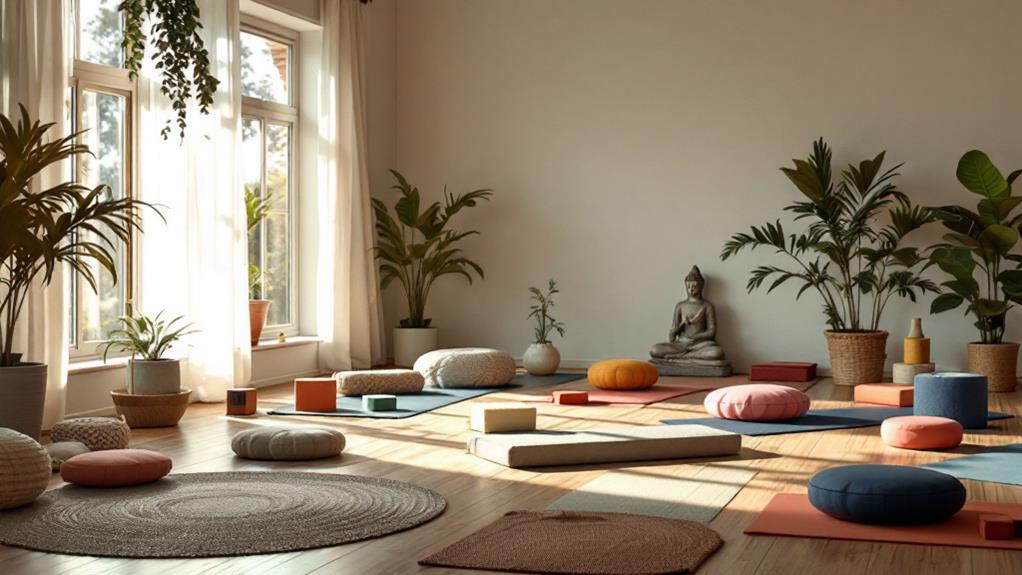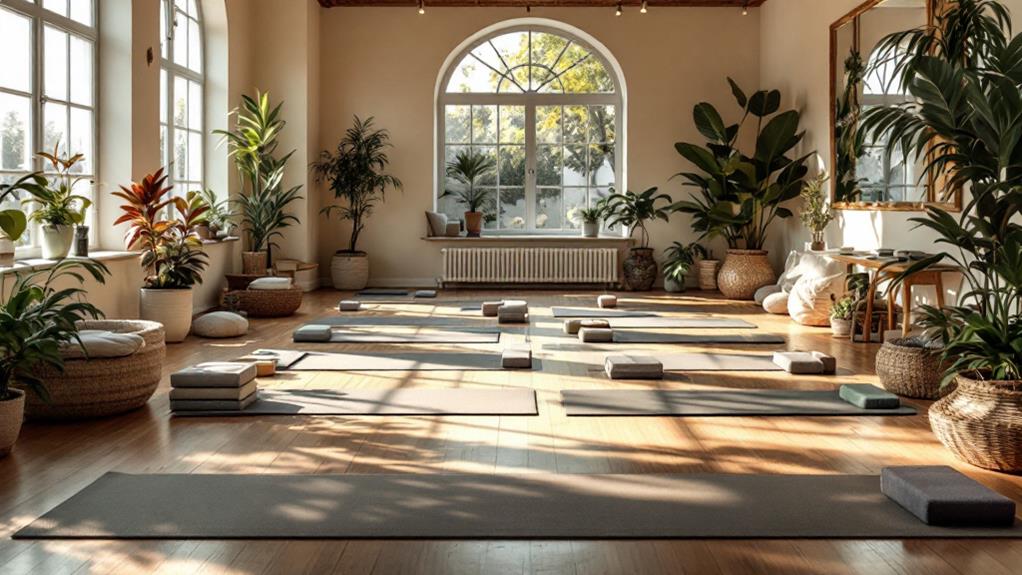What Are the Different Types of Yoga? A Comprehensive Guide
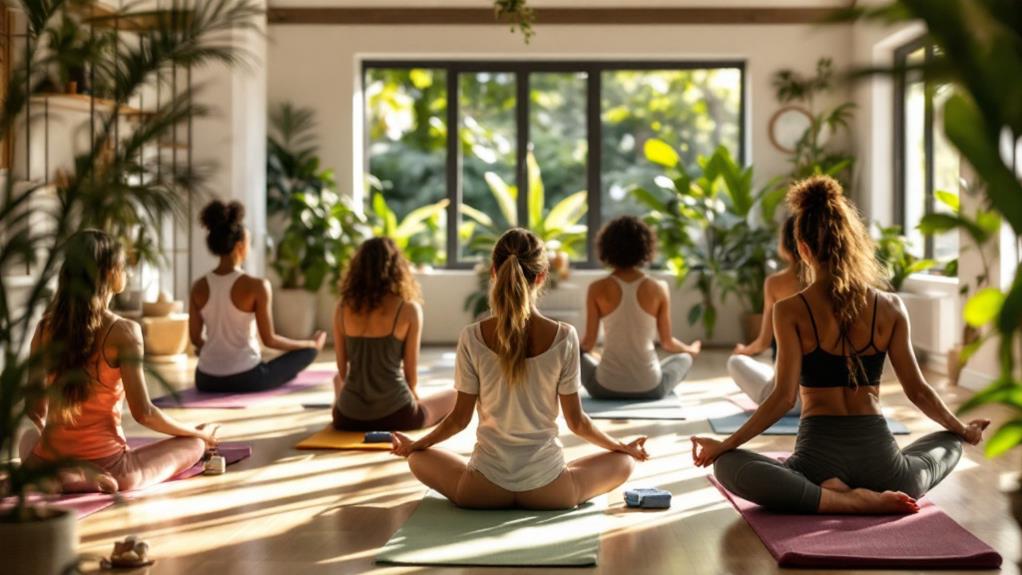
When exploring yoga, you'll find diverse styles, each offering unique benefits and practices. Hatha Yoga lays a strong foundation with gentle postures and breathwork, making it perfect for beginners. Vinyasa Yoga delivers a dynamic, flowing experience, while Iyengar focuses on precise alignment with props. For a more vigorous challenge, try Ashtanga's structured sequences, or relax deeply with Yin's meditative poses held for longer periods. Each style improves flexibility, strength, and mental focus. Your choice depends on personal goals, regardless of seeking relaxation, a physical workout, or mindful exploration. Immerse deeper to uncover which type aligns with your path.
History and Philosophy
Yoga's roots stretch back over 5,000 years to ancient India, where it emerged as a spiritual practice intertwined with Hinduism and Buddhism. At its core, yoga means "to unite," symbolizing the integration of body, mind, and spirit. This ancient practice isn't just about physical postures, known as asanas, but also involves a profound philosophy and history that guides practitioners toward a holistic approach to life.
Central to yoga's philosophy is the Yoga Sutra by Patanjali, which introduces the Eight Limbs of Yoga. This extensive framework includes asanas, but also covers ethical guidelines (Yamas and Niyamas), breath control (Pranayama), meditation, and achieving states of absorption (Samadhi). These elements work together to guide your personal development and spiritual enlightenment.
The ethical guidelines emphasize principles like ahimsa, or non-violence, encouraging mindfulness in every aspect of life. This philosophy extends beyond the mat, promoting health and well-being in a holistic manner. As you explore yoga's history and philosophy, you'll uncover how it's more than just exercise; it's a path to uniting your body, mind, and spirit.
Popular Yoga Styles
Among the myriad of yoga practices available today, several styles have gained immense popularity due to their unique approaches and benefits. Hatha Yoga serves as a foundational practice focusing on physical postures and breath control. It's perfect for beginners or anyone seeking a gentler approach to yoga. You'll find it a great way to build a solid base for your practice.
If you're looking for something more dynamic, Vinyasa Yoga might be your style. It's characterized by its dynamic flow, linking breath with movement. This athletic yoga style keeps you moving through continuous sequences of poses, offering both a physical challenge and a mental focus.
For those interested in precision, Iyengar Yoga offers an emphasis on alignment. Utilizing props like blocks and straps, it guarantees safety and accessibility, making it ideal for practitioners at any level, especially if you have injuries.
Ashtanga Yoga requires dedication, as it follows a specific, physically demanding sequence. Memorizing the series helps create a consistent practice.
Meanwhile, Yin Yoga invites you to slow down. By holding passive poses for extended periods, it targets deep connective tissues, enhancing flexibility and promoting relaxation. This style suits anyone looking to unwind.
Benefits of Yoga
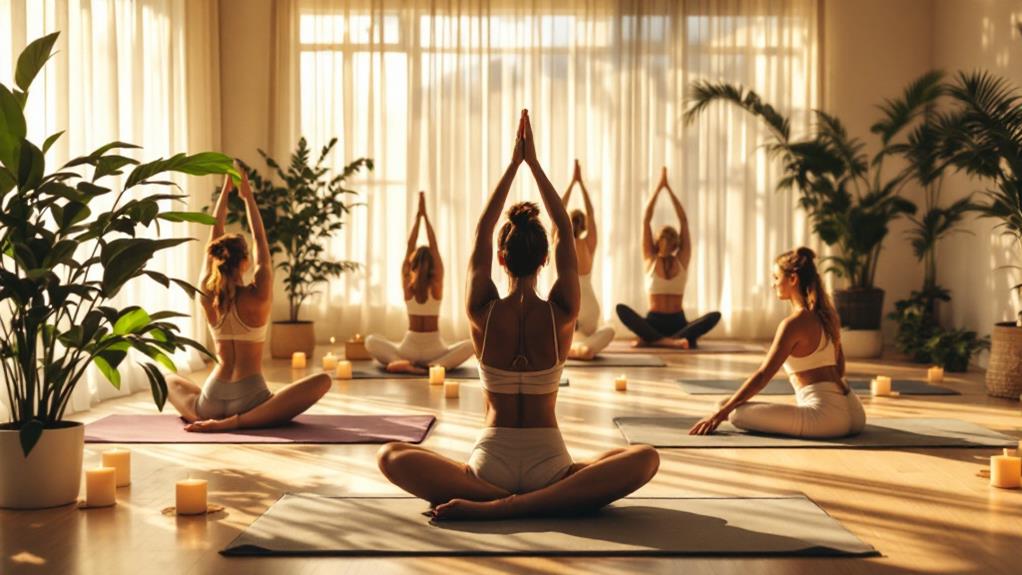
While exploring popular yoga styles, it's clear that each offers unique advantages and experiences. One of the primary benefits of yoga is its ability to reduce stress and elevate mental health. By incorporating mindfulness techniques, you can improve mental clarity and focus, leading to enhanced cognitive function and memory. Regular practice can also promote relaxation, boosting your emotional well-being and total well-being.
Physically, yoga is exceptional for improving flexibility, balance, and strength. This contributes to better physical health and reduces the risk of injury. You'll find that as your body becomes more flexible, your everyday movements become more fluid and comfortable.
Yoga doesn't just benefit you physically and mentally; it also improves your sleep quality. Many practitioners report better rest and reduced insomnia symptoms, which can have a profound impact on your day-to-day life.
Additionally, engaging in yoga creates a sense of community and belonging. Practicing with others fosters social connections and provides a support system, improving your emotional health. Regardless if you're looking to improve your physical or mental health, or simply seeking a community, yoga offers a holistic approach to elevating your life.
Techniques and Practices
When diving into yoga techniques and practices, you'll uncover a rich tapestry of methods designed to improve both your physical and mental well-being. At the heart of your practice are asanas, the physical postures that augment flexibility and strength. These poses form the foundation of any physical practice, requiring proper alignment to guarantee safety and effectiveness. As you move through a series of poses, you'll notice improvements in balance and general body awareness.
Incorporating pranayama, or breath work, further enriches your experience. By focusing on breath control, you regulate energy flow and elevate concentration, seamlessly supporting your asanas. Pranayama is often practiced alongside meditation, which is essential for cultivating mindfulness and inner peace. With numerous forms available, you're sure to find a meditation technique that aligns with your personal goals.
Sun Salutations are another key element, providing a dynamic warm-up through their flowing sequence. These series of poses prepare your body for deeper exploration and are especially popular in styles like Vinyasa. Ultimately, Savasana, the ultimate relaxation pose, allows you to integrate the session's benefits, promoting deep relaxation and a sense of calm.
Choosing Your Yoga Style
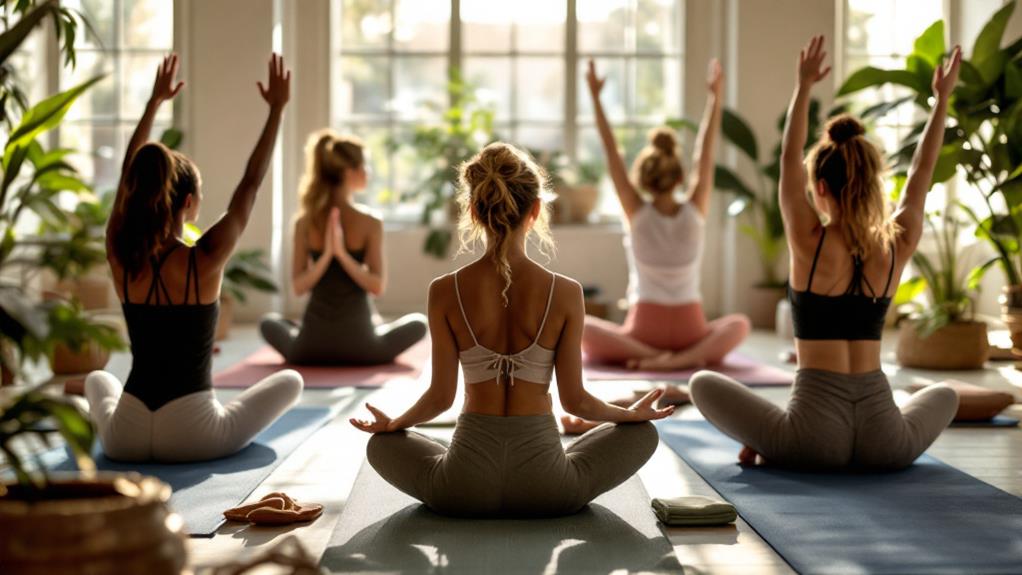
As you consider the distinct techniques and practices of yoga, selecting the right style for your adventure becomes an exciting next step. Choosing the right yoga style hinges on your personal fitness goals. If relaxation is your aim, Restorative Yoga offers a sanctuary of calm. Conversely, if you're after a vigorous workout, Power Yoga might be your go-to. For beginners, Hatha Yoga provides a gentle introduction, guiding you through fundamental postures and breath control. It's an excellent starting point to build your yoga foundation.
Should you have physical limitations or injuries, Iyengar Yoga could be your best option. Its focus on alignment and use of props provides the support needed to safely engage in yoga. For those who thrive on routine, the structured sequences of Ashtanga Yoga might align with your preferences. On the other hand, if you crave creativity and collaboration, Acro Yoga can bring a playful element to your practice.
Trial classes can be invaluable in exploring different styles. By sampling a range of approaches, you'll uncover what resonates most with your body and mind, setting the stage for a fulfilling and personalized yoga expedition.

